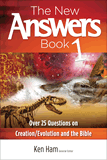Tongue-Twisting Tales
One Language, Many Legends
Stories about a global Flood and a surviving family are worldwide. While not as common, stories about a time when there was only one language do exist.
North America
A legend of the Maidu Indians of California says that everybody spoke the same language until during preparations for a special burning ceremony, when “suddenly in the night everybody began to speak in a different tongue except that each husband and wife talked the same language.”
Then, according to the legend, God instructed a leader named Kuksu, who could speak all the languages, to summon all the people together and teach “them the names of the different animals and so forth in their various dialects. . . . Then he called each tribe by name, and sent them off in different directions, telling them where they were to dwell.”
Central America
An Aztec legend claimed,
“Humanity was wiped out by a flood, but one man Coxcoxtli and one woman Xochiquetzal escaped in a boat, and reached a mountain called Colhuacan. They had many children, who were dumb until the time when a dove on top of a tree made them the gift of languages; but these differed so much that the children could not understand each other.”
Guatemala
The Quiches of Guatemala told of a time when the tribes multiplied and left their old home to a place called Tulan. Here the language changed, and the people sought new homes in various parts of the world as a result of not being able to understand each other.
Africa
A legend of the Wa-Sania tribe in East Africa says
“that of old all the tribes of the earth knew only one language, but that during a severe famine the people went mad and wandered in all directions, jabbering strange words, and so the different languages arose.”
India
The Mikir tribe in northeastern India tells of the descendants of Ram who were strong men and were growing dissatisfied with earth and aspired to conquer heaven. They began to build a tower.
“Higher and higher rose the building, till at last the gods and demons feared lest these giants should become the masters of heaven, as they already were of earth. So they confounded their speech, and scattered them to the four corners of the world. Hence arose all the various tongues of mankind.”
Europe
The Greeks had a legend that
“for many ages men lived at peace, without cities and without laws, speaking one language, and ruled by Zeus alone. . . . At last Hermes introduced diversities of speech and divided mankind into separate nations.”
Polynesia
Polynesians on the island of Hao said that Rata and his three sons survived a great flood. Then
“they made an attempt to erect a building by which they could reach the sky, and see the creator god Vatea [Atea]; but the god in anger chased the builders away, broke down the building, and changed their language, so that they spoke diverse tongues.”
Middle East
Sumerians believed that all people spoke one language, as claimed in the poem “Enmerkar and the Lord of Aratta”:
In those days . . . the whole universe, the people in unison, . . .
Enki, the Lord of abundance, . . .
Changed the speech in their mouths, and [brought?] contention into it,
Into the speech of man that [until then] had been one.
Southeast Asia
A legend of the Gaikho tribe of Burma (Myanmar) says,
“In the days of Pan-dan-man, the people determined to build a pagoda that should reach up to heaven. . . . When the pagoda was half way up to heaven, God came down and confounded the language of the people, so that they could not understand each other. Then the people scattered, and Than-mau-rai, the father of the Gaikho tribe, came west, with eight chiefs, and settled in the valley of the Sitang.”
REFERENCE LIST
- James George Frazer, Folklore in the Old Testament: Studies in Comparative Religion, Legend, and Law (New York City: Hart Publishing, 1975), pp. 150–151.
- Samuel N. Kramer, “The Babel of Tongues: A Sumerian Version,” Journal of the American Oriental Society 88, no.1 (January–March 1968), pp. 108–111.
- Larousse Encyclopedia of Mythology (Prometheus Press, 1959), p. 445.
- Rev. J. H. Titcomb, “Personal Recollections of British Burma and Its Church Mission Work in 1878– 79,” Project Canterbury (London, 1880).
- Robert W. Williamson, Religious and Cosmic Beliefs of Central Polynesia (Cambridge 1933), 1:94.
Answers Magazine
April – June 2008
This issue focuses on the Tower of Babel and its impact on mankind, covering the event at Babel, skin shades, today’s languages, ape and human fossils, and much more. Don’t miss it!
Browse IssueRecommended Resources

Answers in Genesis is an apologetics ministry, dedicated to helping Christians defend their faith and proclaim the good news of Jesus Christ.
- Customer Service 800.778.3390
- Available Monday–Friday | 9 AM–5 PM ET
- © 2026 Answers in Genesis




